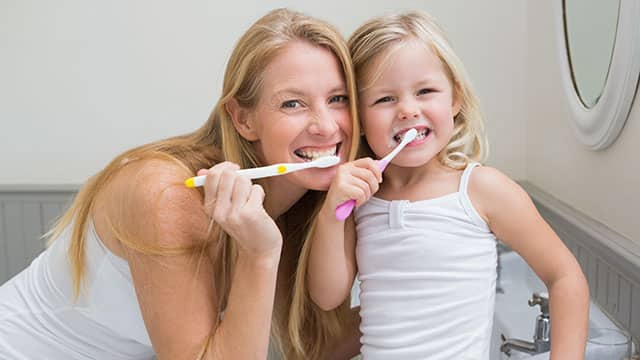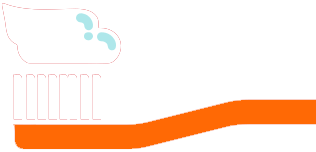Children learn to take care of themselves and develop new life habits that we often take for granted. Helping your child learn the skill of brushing their teeth can be challenging—especially when they mistake toothpaste for food. If your child is eating toothpaste, it can present all sorts of stressful questions: What happens if my child eats toothpaste? Will we have to go to the hospital emergency room? Is it bad to swallow toothpaste? Luckily, swallowing a small amount should not be a reason to sound the alarm; however, it’s important to know the risks involved if they ingest a large amount.

What To Do If Your Child Swallows Toothpaste
Medically Reviewed By Colgate Global Scientific Communications
Let’s take a look at what happens when your child swallows or eats toothpaste, what to do if your child swallows toothpaste, and tips to prevent it.
What Happens When My Child Swallows Toothpaste?
In short, it depends on the type and amount of toothpaste. According to the U.S. National Library of Medicine, if your child swallows non-fluoride toothpaste, your child will not need emergency attention as those kinds of toothpaste are typically non-toxic. However, if your child swallows toothpaste that contains fluoride, which is a key active ingredient for fighting cavities, the amount of toothpaste swallowed will determine whether or not you should seek medical attention.
The good news is that, according to the American Dental Association, if your child swallows the recommended amount of fluoride toothpaste (a pea size), you don’t need to worry, especially if you’re supervising them. That’s because the recommended size should not be enough to have a toxic effect on their body. However, the National Capital Poison Center reports that if your child swallows a larger amount of fluoride toothpaste, they may experience mild symptoms like an upset stomach. More serious symptoms could be nausea, vomiting, and diarrhea.
What Should I Do If My Child Swallows Toothpaste?
If your child swallows toothpaste, it’s important to stay calm. First, as mentioned before, it’s unlikely for a child to experience anything beyond a stomach ache if the amount of toothpaste swallowed is small. One thing you can do is give your child water or a snack or beverage with calcium, like milk or yogurt (unless told otherwise by a health care provider). This will help ease a stomach ache as the calcium will bind with the fluoride.
If your child has swallowed a large amount of toothpaste, again—it’s important to stay calm and not take extreme measures, like forcing your child to vomit. The best course of action is to immediately call your local poison center for treatment advice from experts in poison. They may recommend home remedies or seeking medical attention.
Preventing Your Child From Eating Toothpaste
Helping your child understand how to use toothpaste is an important step in developing good oral health habits. Here are some tips to help your child not eat toothpaste:
Monitor Their Toothpaste Use: The best way to prevent your child from eating toothpaste is to apply just the right amount to his toothbrush yourself. That way, if they do swallow toothpaste, you’ll be aware of how much they ingested. Further, you should keep the toothpaste container away from your child when they’re not brushing their teeth, such as a high cabinet or a locked medicine cabinet.
Make Sure They’re Spitting and Rinsing: You should also ensure that your child spits out the toothpaste instead of swallowing it each time they brush and that they thoroughly rinse with clean, freshwater afterward to remove the toothpaste residue. The amount of toothpaste used in brushing is safe to swallow, but this will reinforce the idea that toothpaste is not meant to be eaten.
Consider Your Toothpaste Flavor: Switching to a stronger, mint-flavored toothpaste rather than candy-flavored varieties might also discourage eating toothpaste. Though, stronger flavors are more suitable for older children, as younger children can be so put off by a strong mint taste that they refuse to brush or use the toothpaste at all.
Brush Your Teeth With Your Child: Another recommendation is to brush your teeth alongside your child. Encourage them to imitate you so that they can develop good habits, such as brushing for at least two minutes, holding the brush at the correct angle, brushing their tongue, and spitting out the toothpaste when they’re done.
Be Patient: Finally, be patient with your child. The desire to eat toothpaste is likely just a passing phase in your child’s life that they will outgrow. When they ask you if you can eat toothpaste, remind them that it’s not a snack. However, if your child consumes a large amount of toothpaste, call the emergency hotline listed on the toothpaste tube or immediately contact a poison control center.
Now that you know a few tips on how to stop children from eating toothpaste, it’s time to put them into practice to form good habits. Remember—your children are learning to form life habits every day, so a fun tube of flavorful, colorful toothpaste could be mistaken for a snack. As long as you monitor your child’s toothpaste use and brush with them, you will not only be monitoring whether or not they swallow toothpaste but also helping them develop safe and healthy oral health habits.
This article is intended to promote understanding of and knowledge about general oral health topics. It is not intended to be a substitute for professional advice, diagnosis or treatment. Always seek the advice of your dentist or other qualified healthcare provider with any questions you may have regarding a medical condition or treatment.







